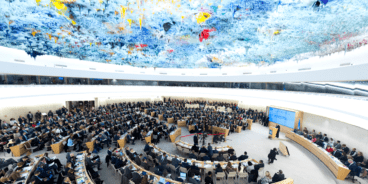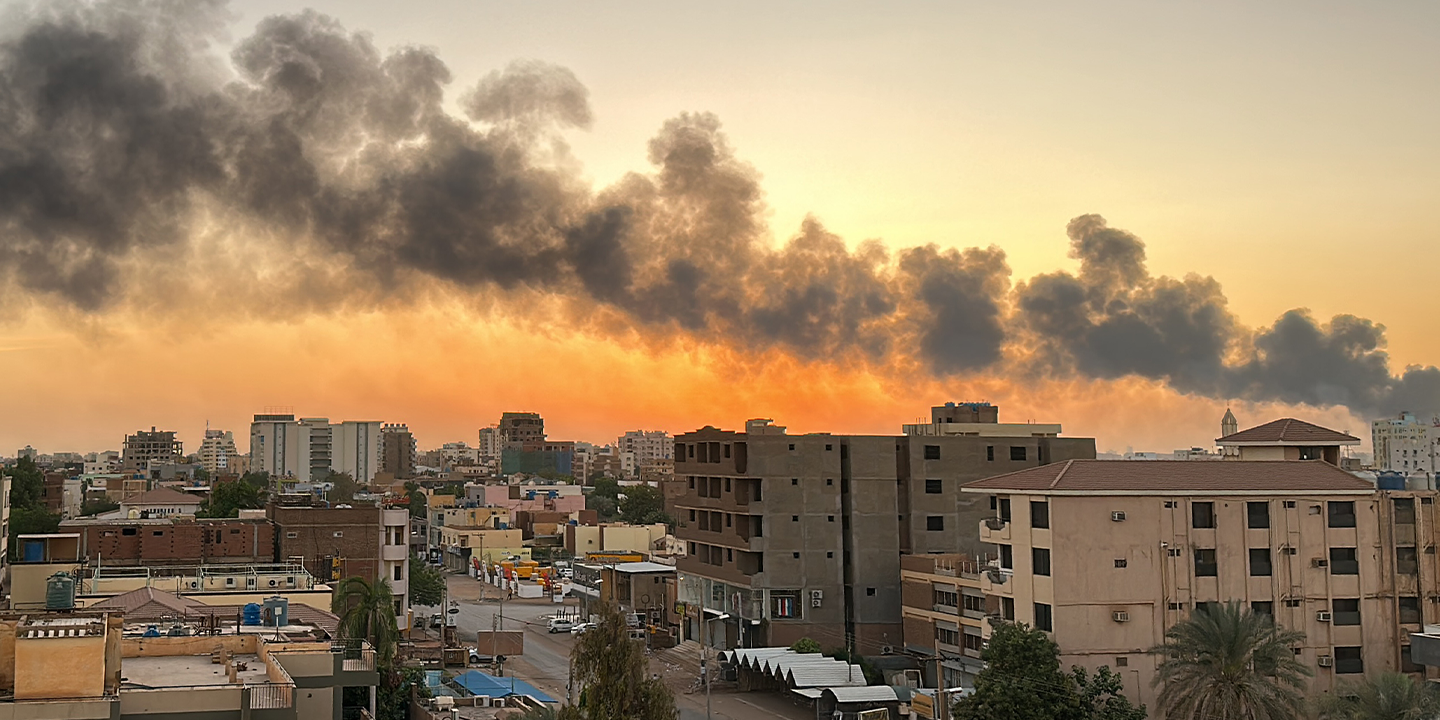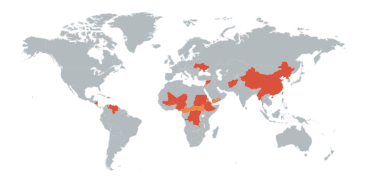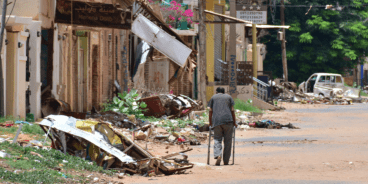

Atrocity Alert No. 344: Sudan, Burkina Faso and Democratic Republic of the Congo
Atrocity Alert is a weekly publication by the Global Centre for the Responsibility to Protect highlighting situations where populations are at risk of, or are enduring, mass atrocity crimes.
HUMAN RIGHTS AND HUMANITARIAN CRISIS DEEPENS AS FIGHTING CONTINUES IN SUDAN
Intense fighting between the Sudanese Armed Forces and Rapid Support Forces (RSF) has entered its second week, with the situation for civilians rapidly deteriorating since the outbreak of violence on 15 April. Several ceasefires have failed to hold, including one that coincided with the Eid al-Fitr holiday. According to the World Health Organization (WHO), more than 459 people have been killed, including at least five aid workers, and 4,072 injured as a result of combat operations and the indiscriminate use of heavy weapons in densely populated areas. RSF fighters have reportedly robbed cars of people fleeing the violence at gunpoint. Responding to reports of sexual and gender-based violence, UN Women’s Executive Director, Sima Bahous, stressed, “We fear that they will only grow more frequent. UN Women calls on all parties to ensure that no woman or girl is affected by these crimes, and on all actors to spare no effort to mitigate the increased risk.”
A catastrophic humanitarian crisis is also unfolding across Sudan as continued fighting is leading to acute shortages of food, medication, electricity and water. Several humanitarian organizations, as well as the World Food Programme, have suspended their operations, evacuated staff or relocated to other areas of the country. The WHO has verified 11 attacks on healthcare facilities and hospitals since 15 April. Despite the continued heavy fighting, the Sudanese people and civil society activists have started coordination efforts through social media to ensure those most in need receive assistance. Medical needs remain highest in Khartoum, as most hospitals are nearly non-functional due to insecurity, staff fatigue and lack of supplies.
Ongoing shelling, rocket strikes and bombardments have triggered a mass exodus from Khartoum, with thousands of people desperately seeking safety elsewhere. The UN Office for the Coordination of Humanitarian Affairs reported that civilian displacement has also been documented in Northern State, Blue Nile, North Kordofan and in North, West and South Darfur. Cross-border movements of thousands of people have been reported in Chad, Egypt and South Sudan. While hundreds of foreign nationals have recently been safely evacuated, UN Secretary-General António Guterres emphasized on 24 April that “the United Nations is not leaving Sudan. Our commitment is to the Sudanese people, in support of their wishes for a peaceful and secure future. We stand with them, at this terrible time.”
All parties should immediately cease hostilities and implement humanitarian pauses to allow civilians and aid workers safe and unhindered freedom of movement, as well as the ability to replenish and access essential supplies and items, such as food, water and medication. The international community should consider targeted sanctions against individuals that undermine Sudanese efforts towards democracy and forming a civilian government.
AT LEAST 150 CIVILIANS KILLED IN LATEST “HORRIFIC” MASSACRE IN BURKINA FASO, SAYS UN
At least 150 civilians, including the elderly, women and children, may have been killed and dozens of others injured during a “horrific” attack on 20 April in Burkina Faso’s northern Yatenga Province, according to the UN. Witnesses in Karma have reported that members of the Burkinabé defence and security forces, accompanied by the government-sponsored Volunteers for the Defense of the Homeland (VDP), encircled the village and randomly shot at people. The armed men subsequently looted homes, shops and mosques. Sources in the neighboring town of Ouahigouya reported hearing gunshots the morning of the attack, three hours after they had seen men in military dress on vehicles and motorcycles headed towards Karma. Deliberately targeting civilians or individuals not taking direct part in hostilities amounts to a war crime.
Earlier this week, Lamine Kabore, a prosecutor in Ouahigouya, said the government had already opened an investigation into the killings, but put the death toll at 60, less than half the number estimated by the UN and local residents. In a statement, Kabore further stated that, “My office was alerted about the seriousness of some of the facts… I therefore gave instructions…to carry out investigations in order to illuminate the said facts and hear all the people who are involved.”
The government recently announced that it opened investigations into previous allegations of human rights abuses committed by defense and security forces. The announcement was in response to calls from the UN High Commissioner for Human Rights to investigate a video showing the extrajudicial executions of seven children in Ouahigouya during mid-February. Government spokesperson Jean-Emmanuel Ouedraogo said in a statement issued on 20 April, “There will be no impunity for the proven perpetrators of human rights violations in Burkina Faso.”
Members of the army and VDP have previously been implicated in grave crimes, including unlawful killings, torture and enforced disappearances, while engaged in counterterrorism operations. There have been few investigations, much less prosecutions for these atrocities. In response to the massacre in Karma – one of the deadliest against civilians by defense and security forces – Ravina Shamdasani, Spokesperson for the UN High Commissioner for Human Rights, stressed that the investigation “must result in credible prosecutions, if such gross violations are to end.”
Christine Caldera, Central Sahel expert at the Global Centre for the Responsibility to Protect, stressed, “As violence perpetrated by armed Islamist groups intensifies and spreads across Burkina Faso, so too have atrocities perpetrated by the security forces and VDPs. While countering violent extremism remains crucial, it cannot be at the cost of protecting civilians.” Burkinabé defense and security forces and VDP members must carry out all military operations in strict compliance with international humanitarian and human rights law, ensuring that counterterrorism objectives do not negate universal human rights protections, and take steps to impartially protect civilians at risk.
VIOLENCE AND ABUSES CONTINUE TO SURGE IN EASTERN DR CONGO DESPITE STATE OF SIEGE
In the first two weeks of April more than 150 civilians were killed and dozens kidnapped by armed groups in the Democratic Republic of the Congo’s (DRC) conflict-ridden Ituri Province, according to humanitarian sources and local authorities. Of the more than 150 dead, at least 55 civilians were killed and several others injured in a single day of attacks in Djugu territory. The UN Office for the Coordination of Humanitarian Affairs (OCHA) also documented the looting of and attacks on health centers and schools, particularly in the Rimba health zone.
Next week marks two years since the government imposed a “state of siege” in the eastern provinces of North Kivu and Ituri with the aim to protect civilians and combat armed groups such as the Cooperative for the Development of Congo (CODECO) and the Allied Democratic Forces (ADF). Under the state of siege, civil authorities have been replaced with military officials who have been granted broad powers. Consequently, military authorities and police have cracked down on fundamental human rights, suppressing peaceful demonstrations with lethal force and arbitrarily detaining and prosecuting activists, journalists and political opposition members. Members of the government’s armed forces (FARDC) have also been implicated in serious human rights violations and abuses in the context of the state of siege and offensives against armed groups.
President Félix Tshisekedi asserted that military control would restore peace and security in provinces where decades of armed conflict and inter-communal violence have left thousands of people dead and forced millions to flee. However, the recent surge in attacks and civilian killings demonstrate that the state of siege has done little to protect civilians and stem the enduring cycle of armed violence. In the first year of the state of siege, the number of civilian casualties more than doubled. The UN Secretary-General’s latest quarterly report estimated that at least 485 civilians were killed between 1 December and 14 March in Ituri alone by myriad armed groups, including CODECO and ADF.
OCHA expressed deep concern that “months of violence and insecurity in the provinces of Ituri and North Kivu have pushed millions of people on the brink of a major humanitarian catastrophe.” Ongoing insecurity has hindered the delivery of vital humanitarian assistance while persistent attacks have restricted communities access to markets and fields. More than 1.1 million people need food assistance in the eastern provinces.
The situation in eastern DRC cannot be solved through military means alone. The DRC government should enact measures to re-establish trust with communities, including by consulting with civilian populations and civil society about protection needs. FARDC troops deployed to Ituri and North Kivu must be properly trained to prevent human rights violations from occurring. All armed groups in the DRC must cease perpetrating senseless attacks on civilian populations and respect their obligations under International Humanitarian Law.
Related Content


R2P Monitor, Issue 70, 1 September 2024
